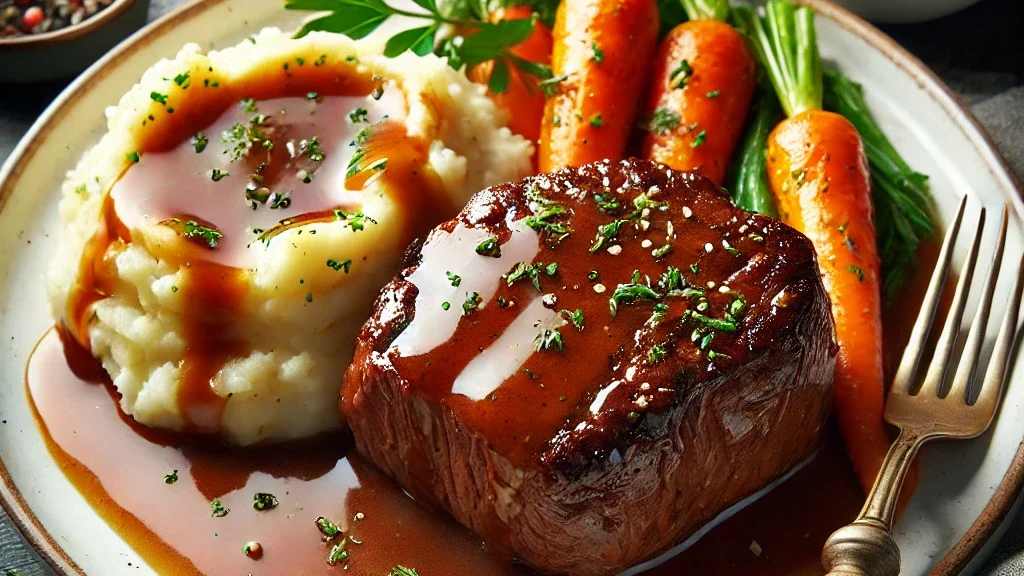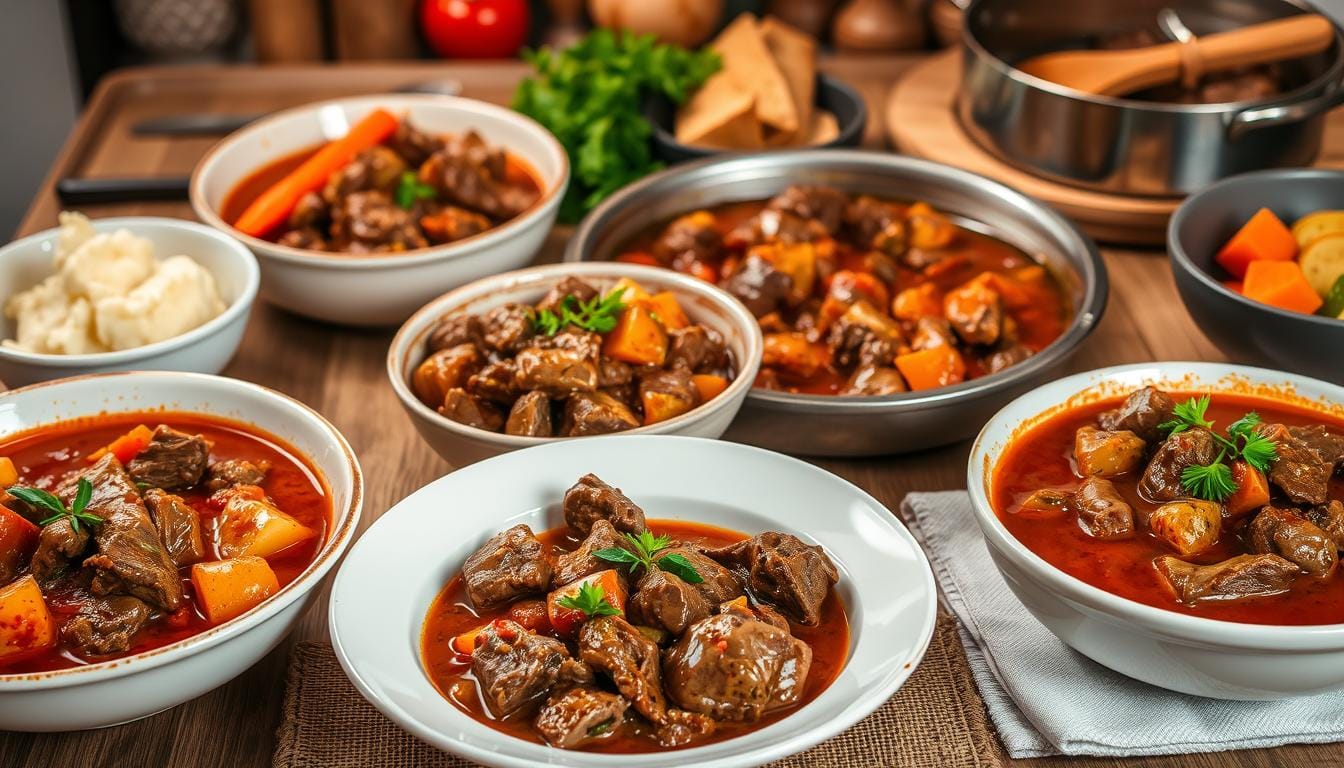Growing up, Sunday dinners at my grandmother’s house were special. Her slow-cooking beef steak filled the kitchen with a wonderful smell. It sparked my love for making tender beef for stew.
Stewing beef steak is more than a meal; it’s a journey. It turns cheap cuts into delicious dishes. Whether you want to impress your family or enjoy hearty flavors, these recipes will help.
We’ll look at classic French methods and global twists. Slow-cooking beef steak brings out incredible flavor and tenderness. Get ready to find new family favorites.
Table of Contents
What is Stewing Beef Steak?
Stewing beef steak is a key part of comfort cooking. It turns tough cuts into delicious meals. When you’re looking for beef stew meat, knowing the basics can really improve your cooking.
Stewing beef comes from the cow’s muscular parts. These parts need slow cooking to become tender. They have tough connective tissues and rich flavors.
Understanding Cuts of Meat
The best beef for stew comes from hardworking parts of the animal. These areas have dense muscle and connective tissue. This might seem tough, but it makes the meat very flavorful when cooked right.
- Chuck roast: An ideal stewing beef cut with excellent marbling
- Bottom round: Lean but perfect for long, slow cooking
- Brisket: Rich flavor that breaks down beautifully
Key Characteristics of Stewing Beef
Stewing beef cuts are perfect for making tough meat tender and tasty. The magic is in collagen breakdown. Low, slow cooking turns hard muscle into soft, delicious meat.
| Cut Type | Flavor Profile | Cooking Time |
|---|---|---|
| Chuck Roast | Rich, Robust | 4-6 hours |
| Bottom Round | Lean, Mild | 3-5 hours |
| Brisket | Intense, Deep | 5-7 hours |
“The secret to perfect stew is patience and understanding your meat.” – Professional Chef
Choosing the right stewing beef cuts and using the right cooking methods can make affordable meat taste like a restaurant dish. It will impress your family and friends.
Essential Ingredients for Stewing Beef Steak
Making the perfect beef stew begins with picking the right ingredients. Your journey to a delicious stew starts with knowing the key parts. These parts turn simple ingredients into a tasty meal.
Choosing the Right Beef
Choosing the right cut of beef is key for stew. Round steak is the best for stewing. It has many benefits:
- It has lots of connective tissue that melts in cooking
- It’s often cheaper than other cuts
- It becomes very tender after slow cooking
Aromatics and Seasonings
The secret to a great stew is in its aromatics and seasonings. Chefs suggest using:
- Fresh garlic
- Herbs de Provence
- Fresh thyme and rosemary
“The right seasonings turn a simple stew into a masterpiece.” – Chef’s Kitchen Wisdom
Vegetables to Enhance Flavor
Choosing the right vegetables makes your stew amazing. Here are some great options:
| Vegetable | Cooking Benefit |
|---|---|
| Carrots | Adds sweetness, keeps texture |
| Celery | Deepens the broth |
| Red Potatoes | Has a creamy texture, soaks up flavors |
| Frozen Peas | Added last for bright color and freshness |
Pro tip: Add peas just before serving to keep their color and crispness. Your stew will taste great and look good too.
Best Cooking Methods for Stewing Beef Steak
Turning tough meat into delicious dishes is all about slow-cooking beef steak. Different cooking methods can make your stewing beef recipes stand out.
Choosing the right cooking method is key to tender, flavorful stews. J. Kenji López-Alt suggests specific ways to make your beef tender and tasty.
Slow Cooking Techniques
Slow cooking is the best way to make tough beef cuts tender. Here are some important techniques:
- Oven braising at 325°F for 2-3 hours
- Dutch oven method with low, consistent heat
- Cooking covered for initial 1½ hours
- Uncovering to reduce and thicken sauce
Instant Pot Recipes
The Instant Pot is great for busy cooks. It cooks beef steak quickly while keeping it tender.
| Cooking Method | Time Required | Meat Tenderness |
|---|---|---|
| Traditional Stove | 2-3 hours | Good |
| Instant Pot | 45-60 minutes | Excellent |
Stovetop Stewing Tips
Stovetop stewing needs patience and skill. Pro tip: Keep a gentle simmer and stir now and then to avoid sticking. Chef Joanne Lusted says boneless chuck roast is best for flavor and texture.
The secret to perfect stew is low and slow cooking, allowing flavors to develop and meat to become incredibly tender.
Remember, cooking times can change based on the beef cut and method. Always check the meat’s tenderness and adjust the cooking time if needed.
Classic Stewing Beef Steak Recipe
Craving a hearty meal? This stewing beef steak recipe will warm your soul. It’s perfect for cold winter evenings, serving six people.

Get ready to make a delicious stewing beef steak. Our recipe combines traditional cooking with wholesome ingredients.
Ingredients You’ll Need
- 2 lbs Beef Chuck, cut into 1-inch cubes
- 3 tablespoons All-Purpose Flour
- 1 teaspoon Salt
- ½ teaspoon Black Pepper
- 2 tablespoons Olive Oil
- 1 large Onion, chopped
- 6 cloves Garlic, minced
- 4 cups Beef Broth
Step-by-Step Instructions
- Coat beef stew meat in flour, salt, and pepper
- Heat olive oil in a Dutch oven
- Brown beef cubes on all sides
- Add onions and garlic, sauté until fragrant
- Simmer for 40 minutes until beef is tender
Tips for Perfecting the Dish
To make your stewing beef steak even better, try these tips:
- Sear the meat thoroughly to develop rich, deep flavors
- Use a Dutch oven for even heat distribution
- Let the stew rest before serving to enhance taste
“A great stew is all about patience and layering flavors” – Culinary Expert
This stewing beef steak is not only delicious but also nutritious. Each serving has 32g of protein and only 419 calories. You can store leftovers in the fridge for up to 5 days or freeze them for later.
Unique Variations of Stewing Beef Steak
Exploring global flavors can make your stewing beef recipes stand out. Stewing beef steak is a blank canvas for creativity. It lets you travel the world through your kitchen.
Different cultures have unique ways of cooking beef stewing steak. This changes the dish’s flavor and character. Let’s explore some exciting global inspirations to take your cooking to the next level.
Asian-Inspired Fusion
Asian cuisine adds vibrant flavors to stewing beef recipes. Try these mouthwatering options:
- Beef and shiitake mushroom stir-fry
- Korean-style braised beef with gochujang
- Chinese five-spice beef stew
Mediterranean Flavor Explosion
Mediterranean cooking brings herbs and robust ingredients to beef stewing steak:
- Greek-style stew with kalamata olives
- Moroccan tagine with preserved lemons
- Italian-inspired beef ragù
Spicy Southwestern Delights
Southwestern cuisine adds bold, spicy flavors to traditional stewing beef recipes:
- Chipotle-infused beef chili
- Green chile beef stew
- Tex-Mex inspired beef posole
“Cooking is about passion, and these global variations will ignite your culinary creativity!” – Chef Maria Rodriguez
These variations show how versatile beef stewing steak is. With the right ingredients and techniques, you can turn a simple cut of meat into a memorable meal.
Preparing Stewing Beef Steak in Advance
Cooking beef for stew needs smart planning. Professional chefs say that preparing ahead can make a big difference. Learning how to prep stewing beef cuts can save time and improve your cooking.
Marinating Magic for Enhanced Flavor
Marinating stewing beef is a key technique. It adds deep, rich flavors to your meat. The right marinade can make even tough cuts tender and delicious.
- Choose acidic ingredients like vinegar
- Add fresh herbs such as rosemary and thyme
- Include garlic and onion for depth of flavor
- Marinate for minimum 4-6 hours, ideally overnight
Smart Freezing Strategies for Meal Prep
Freezing prepped ingredients makes stews easy to make. The right freezing methods keep your stewing beef’s quality and taste.
| Ingredient | Preparation Method | Freezing Duration |
|---|---|---|
| Stewing Beef Cuts | Brown meat, cool completely | Up to 3 months |
| Vegetables | Chop and blanch | Up to 2 months |
| Marinade | Seal in freezer-safe container | Up to 1 month |
“Preparation is the secret ingredient that transforms good cooking into great cuisine.” – Professional Chef
Using these advanced preparation methods makes cooking easier. You’ll get delicious, restaurant-quality stews every time.
Pairing Your Stewing Beef Steak
Once you’ve nailed your beef stew meat recipe, picking the right sides and drinks can make your meal even better. Stewing beef recipes need side dishes and drinks that match their rich, hearty taste.
Ideal Sides for Stews
The right side can turn your beef stew into a full meal. Here are some tasty choices:
- Crusty artisan bread for soaking up savory sauce
- Creamy mashed potatoes
- Buttered egg noodles
- Roasted seasonal vegetables
- Cauliflower rice for a low-carb option
Beverage Suggestions
Choosing the right drink can bring out the best in your stew.
- Cabernet Sauvignon – Robust and full-bodied
- Merlot – Smooth with balanced tannins
- Syrah/Shiraz – Spicy undertones
For those who prefer not to drink alcohol, rich beef broth or vegetable juice cocktails work well. They should match the stew’s bold flavors.
Common Mistakes to Avoid
Making a great beef stew is more than just mixing ingredients. Many home cooks make mistakes that ruin a dish. Knowing these errors helps you make tender, flavorful stew.

When cooking beef stew, some mistakes can ruin it. Here are the most important ones to avoid:
Preventing Overcooking
Overcooking is a big problem for tender beef stew. The key is to simmer gently, not boil fast. Professional chefs say to keep the stew at 284°F to 320°F.
- Check meat tenderness regularly
- Use low, steady heat
- Avoid boiling the stew
Seasoning Strategies
Seasoning right makes a stew amazing. Don’t add salt and spices only at the end. Instead, add them throughout cooking.
“Seasoning is an art, not just a last-minute addition.”
- Season meat before browning
- Use herbs like thyme and rosemary
- Add salt early to develop depth
- Taste and adjust seasonings periodically
Avoiding these mistakes makes your beef stew tender, flavorful, and impressive.
Health Benefits of Stewing Beef Steak
Beef stew meat is a nutritional powerhouse. It offers many health benefits that can make your meals better. Slow-cooking beef steak is not just about tasty flavors. It also nourishes your body with important nutrients.
Nutritional Powerhouse of Beef
Beef stew meat is full of nutritional value. A single serving gives you:
- High-quality protein (26g per 100g)
- Essential minerals like iron and zinc
- Critical B vitamins for energy metabolism
Lean cuts of slow-cooking beef steak have great health benefits. Nutritionists see beef as a top protein source. It helps keep muscles strong and supports overall health.
Benefits of Home-Cooked Meals
When you cook your own beef stew, you can pick the best ingredients. Choose lean cuts and add veggies for a balanced meal. This beats store-bought options.
| Nutrient | Amount per 100g | % Daily Value |
|---|---|---|
| Protein | 26g | 52% |
| Total Fat | 17g | 26% |
| Iron | 2.7mg | 15% |
“Nutrition is not just about eating—it’s about eating intelligently.” – Unknown
Remember, moderation is important. Enjoying slow-cooking beef steak in a balanced diet offers many health benefits. It also makes your meals delicious.
Creative Leftover Ideas
Turning leftover stewing beef steak into new meals saves time and money. It keeps your family’s taste buds excited. Repurposing beef stewing steak doesn’t have to be dull or repetitive.
Many home cooks wonder what to do with leftover beef stewing steak. Luckily, there are many tasty ways to make it into new dishes. These can be ready in under 30 minutes.
Recipes to Reuse Stewed Beef
- Beef Tacos: Shred leftover stewing beef and make quick, tasty tacos with fresh toppings
- Stuffed Baked Potatoes: Top warm potatoes with chopped stewed beef and cheese
- Beef Shepherd’s Pie: Layer leftover meat with mashed potatoes for a cozy meal
Quick Meals with Leftovers
Stewing beef recipes are very flexible. In just 3 days, you can turn leftover meat into new dishes.
| Meal Type | Preparation Time | Ingredients Needed |
|---|---|---|
| Beef Quesadillas | 25 minutes | 8 oz Monterey Jack cheese, leftover beef |
| Beef Meatballs | 30 minutes | Breadcrumbs, eggs, leftover beef |
| Beef Soup | 20 minutes | Vegetables, broth, leftover beef |
“Creativity in the kitchen starts with seeing potential in leftovers.” – Professional Chef
Always store leftover beef stewing steak in an airtight container in the fridge. Eat it within 3 days for the best taste and quality. Your wallet and taste buds will appreciate it!
Conclusion: Making the Most of Your Stewing Beef Steak
Your journey into making stewing beef steak dishes has been full of flavor, technique, and creativity. Learning to prepare stew meat takes patience and practice. Each batch is a chance to get better.
Trying different cuts like chuck or bottom round can change your stew’s texture and taste. Searing your beef before slow cooking adds a deep flavor. You can use Instant Pot or stovetop methods to fit your schedule and kitchen.
Final Reminders for Flavorful Cooking
Remember to brown your meat well, cook it slow, and season it right. These steps are key for a delicious meal, whether it’s a classic stew or a new take. With time, you’ll go from a beginner to a pro at making mouthwatering stewing beef steak.


1 thought on “Delicious Stewing Beef Steak Recipes You Need to Try”